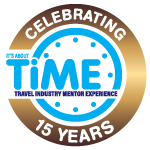Many successful people attribute part of their professional success to having a mentor.
Mentors provide a wealth of knowledge and experience to us, they guide us through challenges and increase our likelihood of success, they lift us up and take our success personally.
They are invaluable.

So why do only 37% of professionals have one?
Olivet Nazarene University wondered why too. They recently surveyed 3,000 people about professional mentor-mentee relationships to see what they look like in 2019.
Here’s what they found:
-
- 76% of people think mentors are important, however, only 37% of people currently have one.
- Most people opt for same-sex mentors (69% women, 82% men)
- People with mentors are happier at their current jobs than those without.
- Only 14% of mentor relationships started by asking someone to be their mentor. 61% of those relationships developed naturally.
Would a mentor be beneficial for you? Ask yourself these questions to find out:
- Would you like to have a trusted and more experienced person to bounce ideas off, to discuss challenges with?
- Are you entering a new industry and would like access to an expert in this new field?
- Are you in a new role and would like access to a seasoned executive that has held the same/similar role for many years?
- Are you a CEO or at the top of your field and feel isolatedbecause you don’t have peers to share problems/brainstorm with?
- Are you considering launching a new venture and are seeking expertise you don’t yet have?
If you answered “yes!” to any of the above questions, you’re ripe for mentorship. First, read my blog on networking. Now using that advice and a bit more below, you’ll be all set to meet the mentor of your dreams!
Here’s how to get one:
- The “friendly stalker” approach: Here’s how I got some time and advice from Steve Jobs. The relationship lasted for many years. Follow this approach as it works every time!
- The “met on a plane” approach: talk to whomever you meet on a plane, even just a little bit. People are interesting. Become curious about them! A month ago I struck up a conversation with a man on a plane. He has become an informal mentor and has already saved me tens of thousands of dollars due to the tax planning advice I received from him.
- The “friend of a friend” approach: one of our clients needed a board member with public company CFO experience, as he’s preparing for his IPO. I connected him with a CFO client of ours with this expertise. The CFO has now joined our client’s Board of Directors and is adding great value.
- The “prepared, then random meeting” approach: I was intrigued by Jerry Jampolsky and wanted to volunteer with his organization. I read all I could, reached out to them, and didn’t hear back. I was getting discouraged when, as fate would have it, I bumped into him at a restaurant. He’s been a mentor of mine now for over 20 years. Sure glad I studied up on him before we bumped into each other!
- The “I care about what you care about” approach: Countless times in my career I’ve reached out to total strangers offering to help them solve a problem. This is how I got my job at Microsoft (as a self-taught engineer without the required college degree), Lotus (remember them?), Apple (yep, before I stalked Steve) and more. Oh, and this is how I met Stephen Hawking (and got invited to the White House).
The Net-Net
- Mentors can profoundly boost your career success and trajectory
- There are a variety of ways to meet them that work
- Be creative and curious, as you’ll be surprised where you can meet mentors

